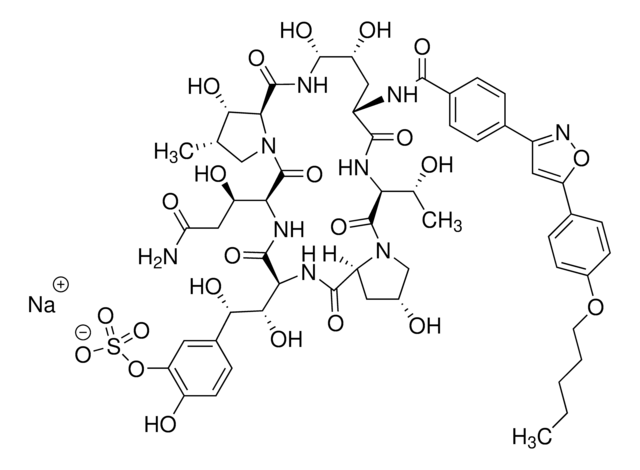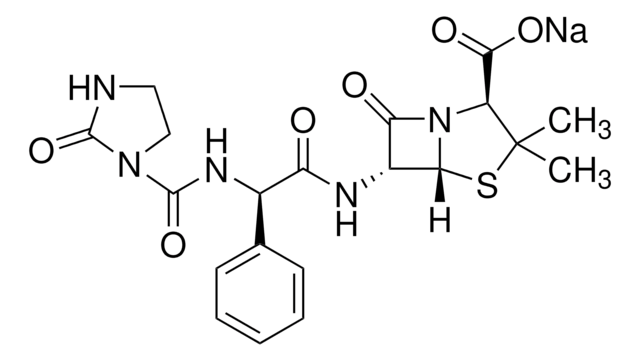A4888
Amphotericin B from Streptomyces sp.
~80% (HPLC), powder
Synonym(s):
LNS-AmB, NSC 527017, Fungizone
About This Item
Recommended Products
biological source
Streptomyces sp.
Quality Level
Assay
~80% (HPLC)
form
powder
color
yellow to orange
solubility
DMF: 2-4 mg/mL
DMSO: 30-40 mg/mL
H2O: insoluble
water: insoluble
antibiotic activity spectrum
fungi
yeast
Mode of action
cell membrane | interferes
storage temp.
2-8°C
SMILES string
C[C@H]1O[C@@H](O[C@@H]2C[C@@H]3O[C@](O)(C[C@@H](O)C[C@@H](O)[C@H](O)CC[C@@H](O)C[C@@H](O)CC(=O)O[C@@H](C)[C@H](C)[C@H](O)[C@@H](C)\C=C\C=C\C=C\C=C\C=C\C=C\C=C\2)C[C@H](O)[C@H]3C(O)=O)[C@@H](O)[C@@H](N)[C@@H]1O
InChI
1S/C47H73NO17/c1-27-17-15-13-11-9-7-5-6-8-10-12-14-16-18-34(64-46-44(58)41(48)43(57)30(4)63-46)24-38-40(45(59)60)37(54)26-47(61,65-38)25-33(51)22-36(53)35(52)20-19-31(49)21-32(50)23-39(55)62-29(3)28(2)42(27)56/h5-18,27-38,40-44,46,49-54,56-58,61H,19-26,48H2,1-4H3,(H,59,60)/b6-5+,9-7+,10-8+,13-11+,14-12+,17-15+,18-16+/t27-,28-,29-,30+,31+,32+,33-,34-,35+,36+,37-,38-,40+,41-,42+,43+,44-,46-,47+/m0/s1
InChI key
APKFDSVGJQXUKY-INPOYWNPSA-N
Looking for similar products? Visit Product Comparison Guide
General description
Application
Amphotericin B from Streptomyces sp. has been used-
- for amphotericin perforated patch technique
- as a reference antifungal drug during MIC (minimum inhibitory concentration) agar dilution assay
- as a component of Arcobacter selective isolation broth
Biochem/physiol Actions
Antimicrobial spectrum: Includes fungi and yeast
Features and Benefits
Preparation Note
Amphotericin B remains active for 3 days in culture at 37°C. At -20°C, and with protection from air and light, the product remains active for 5 years.
Storage and Stability
Other Notes
Signal Word
Danger
Hazard Statements
Precautionary Statements
Hazard Classifications
STOT RE 1
Storage Class Code
6.1C - Combustible acute toxic Cat.3 / toxic compounds or compounds which causing chronic effects
WGK
WGK 3
Flash Point(F)
Not applicable
Flash Point(C)
Not applicable
Personal Protective Equipment
Regulatory Listings
Regulatory Listings are mainly provided for chemical products. Only limited information can be provided here for non-chemical products. No entry means none of the components are listed. It is the user’s obligation to ensure the safe and legal use of the product.
JAN Code
A4888-5G:
A4888-250MG:
A4888-500MG-PW:
A4888-500MG:
A4888-100MG-PW:
A4888-100MG:
A4888-250MG-PW:
A4888-BULK:
A4888-1G:
A4888-5G-PW:
A4888-VAR:
A4888-1G-PW:
A4888-100G:
A4888-100G-PW:
A4888-25MG:
Choose from one of the most recent versions:
Already Own This Product?
Find documentation for the products that you have recently purchased in the Document Library.
Customers Also Viewed
Our team of scientists has experience in all areas of research including Life Science, Material Science, Chemical Synthesis, Chromatography, Analytical and many others.
Contact Technical Service











